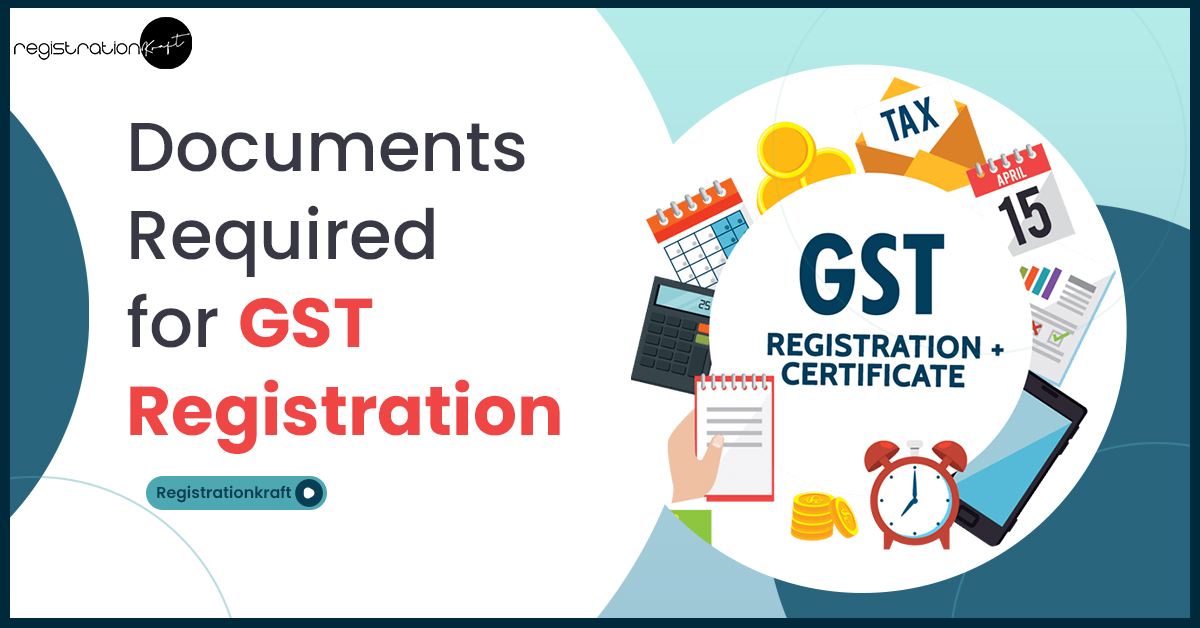Documents Required for GST Registration

After the launch of GST in India, the indirect taxes came under one tax. The businesses get the benefits of lower taxes. However, to obtain the benefits, businesses are required to obtain the GST registration. In this, they have to file the registration application to the GST authority.
With the application, the required documents should be attached for quick approval of the application. Also, the documents work as proof of the business. In the article, we share the different types of documents required for GST registration, Suo Moto registration, filing clarification and cancellation.
What is GST Registration?
GST registration is the process of obtaining a unique Goods and Services Tax Identification Number (GSTIN) from the government. To obtain a GST, the annual turnover should exceed Rs. 20 lakh (the limit is Rs. 40 lakhs for certain states). The business must engage in the interstate supply of goods or services.
The registration will help you to collect and pay the GST on the supply of goods and services. Increase the business credibility and compliance and facilitate interstate trade without multiple taxes. As discussed above, the GST is a single tax for multiple indirect taxes. The GST replace VAT to reduce the limitations of the old system.
Documents Required for New GST Registration
The new GST registration application is a way to request the government to obtain a Goods and Services Tax Identification Number (GSTIN). The GST number is a unique 15-digit number that is mandatory for businesses to meet certain criteria, making them eligible to collect and pay GST on the supply of goods and services.
Required Documents for Private Limited Companies
- Proof of Constitution of Business – Certificate for Incorporation
- Photo of Stakeholder (Promoter/ Partner)
- Photo of Authorised Signatory
- Proof of Appointment of Authorised Signatory (any one) – Letter of Authorisation or Copy of Resolution passed by BoD, Managing Committee and Acceptance letter
- Proof of Principal Place of business (any one) – Electricity Bill, Legal ownership document, Municipal Khata Copy, Property Tax Receipt, Rent/ Lease agreement, or Rent receipt with NOC.
Important Documents for Suo Moto Registration
When an individual fails to obtain the GST number, then the tax authorities can initiate a process of allotment and generation of Temporary ID through the Suo Moto registration facility. During the enforcement period, the tax authorities can initiate the Suo Moto registration and deposit the tax collected from such unregistered individuals.
- Attachment of Photo ID – Voter ID, Passport, Aadhaar Card, Any other document.
- Attachment of Seized Document.
Filing Clarification for GST Application
In the GST, filing clarification refers to the process of addressing the queries or concerns raised by the GST authorities. The query can be related to the GST registration application or any other related information. This is important for you to explain or rectify any discrepancies or incomplete information identified by a Tax Official in the application.
- Upload any supporting documents related to the query, if there is any.
Cancellation of Registration
Cancellation is the process of terminating a business’s GST identification number (GSTIN). It shows that the business has no need to comply with GST regulations and has no GST obligations. Some reasons for the cancellation are as follows:
- Discontinuation of business operations.
- Merger or amalgamation with another entity.
- Change in business structure.
- Non-filing of GST returns for consecutive time.
- Businesses engage in fraudulent activities.
Documents Required for Cancellation
Any supporting documents can be uploaded by the applicant or taxpayer in support of reasons for cancellation of registration.
Post Registration Site Visit
A post-registration site visit is an inspection conducted by GST authorities at the business premises of a newly registered taxpayer. This is a way to verify whether the information provided in the registration application by the applicant is correct or not. The business is assessing the business’s compliance with GST rules. For the document, a photo of the place and persons is needed during the post-registration site visit.
Nature of Possession of Premises
The document submitted as proof of the principal place of business is based on the nature of the premises. The following are the nature of possession of premises in GST registration.
Consent Property
Many businesses carry their work from home because they do not have a registered commercial place for business. So, if the premise on which the work is carried out is owned, then a supporting document for the taxpayer’s ownership should be uploaded at the time of registration. The owner of the premises should sign a consent letter as the GST officer asks for it.
Leased Property
A leased property is a property that is used by someone who doesn’t own it. This simply means that they have temporary rights to use the property in exchange for paying rent to the owner. The owner of the property is known as the lessor and the person using the property is known as the lessee. In a lease, the time of agreement is written, a few months or years.
Shared Property
The shared property has two types, one is co-owned property for business purposes and shared space within a rented property. So, to register for the GST, a consent letter must submit to the authority.
Owned Property
The owned property means a property of which you have the exclusive rights. You have complete control over the use of the property, management, and some potential modifications. The ownership of the property has two types; sole ownership and joint ownership.
Rented Property
The rented property has temporary ownership in exchange for which you pay rent to the owner of the property. In this case, you don’t own the property but gain temporary rights to occupy and use it for some specific period as mentioned in the agreement.
Conclusion
To conclude, the GST is important for every business these days whether it’s a small business or a large organization. After the registration of GST on the GST portal, if any organization is found carrying the business without registering under GST. Then it is an offence and for that, the heavy penalties have to pay by a business.
Categories: Taxation
Tags: Facts about GST, GST, GST Registration





